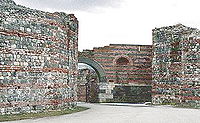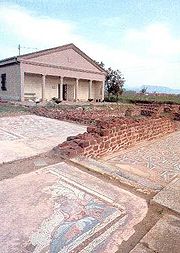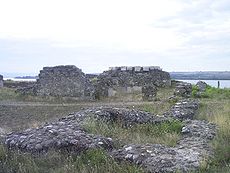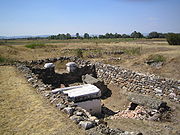
Archaeological Sites of Exceptional Importance (Serbia)
Encyclopedia
Archaeological Sites of Exceptional Importance are the archaeological site
s in the Republic of Serbia that have the highest level of the State protection, and some of them are part of the UNESCO World Heritage Sites.
The sites are part of the Cultural Heritage of Serbia protection list.
Archaeological site
An archaeological site is a place in which evidence of past activity is preserved , and which has been, or may be, investigated using the discipline of archaeology and represents a part of the archaeological record.Beyond this, the definition and geographical extent of a 'site' can vary widely,...
s in the Republic of Serbia that have the highest level of the State protection, and some of them are part of the UNESCO World Heritage Sites.
The sites are part of the Cultural Heritage of Serbia protection list.
| Photo | Name | Date | Municipality/City | Location, Address | Note | Ref(s) |
|---|---|---|---|---|---|---|
 |
Vinča-Belo Brdo | Neolithic Neolithic The Neolithic Age, Era, or Period, or New Stone Age, was a period in the development of human technology, beginning about 9500 BC in some parts of the Middle East, and later in other parts of the world. It is traditionally considered as the last part of the Stone Age... , Copper Age Copper Age The Chalcolithic |stone]]") period or Copper Age, also known as the Eneolithic/Æneolithic , is a phase of the Bronze Age in which the addition of tin to copper to form bronze during smelting remained yet unknown by the metallurgists of the times... , Bronze Age Bronze Age The Bronze Age is a period characterized by the use of copper and its alloy bronze as the chief hard materials in the manufacture of some implements and weapons. Chronologically, it stands between the Stone Age and Iron Age... , Iron Age Iron Age The Iron Age is the archaeological period generally occurring after the Bronze Age, marked by the prevalent use of iron. The early period of the age is characterized by the widespread use of iron or steel. The adoption of such material coincided with other changes in society, including differing... , Medieval |
Grocka Grocka Grocka is a suburban neighborhood and one of 17 municipalities which constitute the City of Belgrade, the capital of Serbia.- Location :... |
Vinča Vinca Vinca is a genus of six species in the family Apocynaceae, native to Europe, northwest Africa and southwest Asia. The English name periwinkle is shared with the related genus Catharanthus .-Description:Vinca plants are subshrubs or herbaceous, and have slender trailing stems 1–2 m long... |
||
 |
Viminacium Viminacium Viminacium was a major city and military camp of the Roman province of Moesia , and the capital of Moesia Superior. The archeological site occupies a total of 450 hectares. Viminacium is located 12 km from Kostolac, was devastated by Huns in the 5th century, but rebuilt by Justinian... |
1st century AD | Kostolac Kostolac Kostolac is a small Serbian town on the Danube river in the Braničevo District. The remains of the Roman capital of the province of Moesia Superior Viminacium are located near Stari Kostolac some 2 km to the east of Kostolac. Kostolac is situated in the municipality of Požarevac... |
Kostolac Kostolac Kostolac is a small Serbian town on the Danube river in the Braničevo District. The remains of the Roman capital of the province of Moesia Superior Viminacium are located near Stari Kostolac some 2 km to the east of Kostolac. Kostolac is situated in the municipality of Požarevac... |
||
 |
Gamzigrad Gamzigrad Gamzigrad is an archaeological site, spa resort and UNESCO World Heritage Site of Serbia, located south of the Danube river, near the city of Zaječar. It is the location of the ancient Roman complex of palaces and temples Felix Romuliana, built by Emperor Galerius... |
298 AD | Zaječar Zajecar Zaječar is a city and municipality in the eastern part of Serbia. According to the 2011 census the town has a population of 36,830, and its coordinates are 43.91° North, 22.30° East... |
Gamzigrad Gamzigrad Gamzigrad is an archaeological site, spa resort and UNESCO World Heritage Site of Serbia, located south of the Danube river, near the city of Zaječar. It is the location of the ancient Roman complex of palaces and temples Felix Romuliana, built by Emperor Galerius... |
 |
|
 |
Justiniana Prima Justiniana Prima Justiniana Prima is an archaeological site near today's Lebane in southern Serbia, It was a Byzantine city that served as the seat of an Archbishopric that had jurisdiction of the Central Balkans... |
535 AD | Lebane Lebane Lebane is a town and municipality in southern Serbia, a part of the Jablanica District. The municipality is located at 41°45'N and 21°45'E and has a population of 21,802 while the town itself has 9,122 inhabitants... |
Prekopčelica Prekopčelica Prekopčelica is a village in the municipality of Lebane, Serbia. According to the 2002 census, the village has a population of 508 people.... |
||
 |
Mediana - Brzi Brod Mediana Mediana is an important archeological site from the late Roman period located in the eastern suburb of the Serbian city of Niš. It represents a luxurious residence with a highly organized economy. Excavatations have revealed a villa with peristyle, thermae, granary and water tower. The residence... |
306 AD | Niš Niš Niš is the largest city of southern Serbia and third-largest city in Serbia . According to the data from 2011, the city of Niš has a population of 177,972 inhabitants, while the city municipality has a population of 257,867. The city covers an area of about 597 km2, including the urban area,... |
Niš Niš Niš is the largest city of southern Serbia and third-largest city in Serbia . According to the data from 2011, the city of Niš has a population of 177,972 inhabitants, while the city municipality has a population of 257,867. The city covers an area of about 597 km2, including the urban area,... Bulevar Cara Konstantina bb |
||
 |
Trajan's Bridge Trajan's bridge Trajan's Bridge or Bridge of Apollodorus over the Danube was a Roman segmental arch bridge, the first to be built over the lower Danube. For more than a thousand years, it was the longest arch bridge in the world, in terms of both total and span length... |
105 AD | Kladovo Kladovo Kladovo is a town and municipality in the Bor District of eastern Serbia. It is situated on the right bank of the Danube river... |
Kostol Kostol Kostol is a village in the municipality of Kladovo, Serbia. According to the 2002 census, the village has a population of 1053 people.... |
For more than a thousand years, it was the longest arch bridge in the world, in terms of both total and span length. | |
 |
Diana Fortress Diana Fortress The Diana Fortress is a Roman castrum built in 100-101 AD in Kladovo, Serbia.It is located on cliffs above the Danube in the Karatas archaeological site near Kladovo. The main buildings were built on a strategic location overlooking the Danube frontier with stone in 100 AD during the reign of... |
101 AD | Kladovo Kladovo Kladovo is a town and municipality in the Bor District of eastern Serbia. It is situated on the right bank of the Danube river... |
Sip Novi Sip Novi Sip is a village in the municipality of Kladovo, Serbia. According to the 2002 census, the village has a population of 909 people.... |
||
| Kraku Lu Jordan Kraku Lu Jordan Kraku Lu Jordan is archeological site in Serbia. It is situated at the confluence of the Brodica river into Pek, near Kučevo. Represents the most explored metallurgical center in eastern Serbia. The metallurgic occupation of the site lasted for about 100 years, beginning around 280 AD and ending... |
End of the 3rd century | Kučevo Kucevo Kučevo is a town and municipality located in the Braničevo District of Serbia. In 2011, the population of the town is 3,950, while population of the municipality is 15,490.... |
Brodica Brodica Brodica is a village in the municipality of Kučevo, Serbia. According to the 2002 census, the village has a population of 468 people.... |
|||
| Rudna Glava Rudna Glava Rudna Glava is a mining site in present-day eastern Serbia that demonstrates one of the earliest evidences of European copper mining and metallurgy, dating to the 5th millennium BC. Shafts were cut into the hillside, with scaffolding constructed for easy access to the veins of ore. It belongs to... |
5th millennium BC | Majdanpek Majdanpek Majdanpek is a town and municipality in Bor District of Serbia. According to 2011 census, the municipality of Majdanpek has a population of 18,179 people, while the town of Majdanpek has a population of 7,367.... |
Rudna Glava Rudna Glava Rudna Glava is a mining site in present-day eastern Serbia that demonstrates one of the earliest evidences of European copper mining and metallurgy, dating to the 5th millennium BC. Shafts were cut into the hillside, with scaffolding constructed for easy access to the veins of ore. It belongs to... |
|||
| Velika humka Velika humka Velika humka is an archeological site and settlement near Pilatovići, Požega municipality, Serbia.In 1983, Židovar was added to the Archaeological Sites of Exceptional Importance list, protected by Republic of Serbia.-See also:... |
Last decade of 4th century BC, and first decade of 5th century BC | Požega | Pilatovići Pilatovići Pilatovići is a village in the municipality of Požega, western Serbia. According to the 2002 census, the village has a population of 803 people.-References:... |
|||
| Židovar Židovar Židovar is an archeological site and settlement near Vršac, Serbia.-History:The earliest findings is of the Bosut-Basarabi culture dating to 9-8th century BC... |
9-8th century BC | Vršac Vršac Vršac is a town and municipality located in Serbia. In 2002 the town's total population was 36,623, while Vršac municipality had 54,369 inhabitants. Vršac is located in the Banat region, in the Vojvodina province of Serbia. It is part of the South Banat District.-Name:The name Vršac is of Serbian... |
Orešac Orešac Orešac or Oreşaţ is a village in Serbia. It is situated in the Vršac municipality, in the South Banat District, Vojvodina province. The village is ethnically mixed and its population numbering 356 people .-Ethnic groups :... |
|||
| Starčevo site | Older neolithic Neolithic The Neolithic Age, Era, or Period, or New Stone Age, was a period in the development of human technology, beginning about 9500 BC in some parts of the Middle East, and later in other parts of the world. It is traditionally considered as the last part of the Stone Age... |
Pančevo Pancevo Pančevo is a city and municipality located in the southern part of Serbian province of Vojvodina, 15 km northeast from Belgrade. In 2002, the city had a total population of 77,087, while municipality of Pančevo had 127,162 inhabitants. It is the administrative center of the South Banat... |
Starčevo Starcevo Starcevo can refer to:* Starčevo, a town in Serbia* Starčevo culture, a neolithic culture of Europe* Startsevo, a village in Bulgaria... |
|||
| Bassianae Bassianae Bassianae or Bassiana was an important ancient Roman town in Pannonia . It was located near present-day Donji Petrovci village in Ruma municipality. Bassianae was second largest town in Syrmia, after Sirmium... |
1st century | Ruma Ruma Ruma is a town and municipality located in Vojvodina, Serbia at . In 2002 the town had a total population of 34,229, while Ruma municipality had a population of 60,006.-History:... |
Donji Petrovci Donji Petrovci Donji Petrovci is a village in Serbia. It is situated in Ruma municipality, Srem District, Vojvodina province. The village has a Serb ethnic majority and a population of 991 people... |
|||
| Gomolava | Neolithic Neolithic The Neolithic Age, Era, or Period, or New Stone Age, was a period in the development of human technology, beginning about 9500 BC in some parts of the Middle East, and later in other parts of the world. It is traditionally considered as the last part of the Stone Age... , Early Bronze Age, Iron Age Iron Age The Iron Age is the archaeological period generally occurring after the Bronze Age, marked by the prevalent use of iron. The early period of the age is characterized by the widespread use of iron or steel. The adoption of such material coincided with other changes in society, including differing... |
Ruma Ruma Ruma is a town and municipality located in Vojvodina, Serbia at . In 2002 the town had a total population of 34,229, while Ruma municipality had a population of 60,006.-History:... |
Hrtkovci Hrtkovci Hrtkovci is a village in Serbia. It is located in the Ruma municipality, in the Srem District, Vojvodina province. The village has a Serb ethnic majority and its population numbering 3,428 people... |
|||
 |
Sirmium Sirmium Sirmium was a city in ancient Roman Pannonia. Firstly mentioned in the 4th century BC and originally inhabited by the Illyrians and Celts, it was conquered by the Romans in the 1st century BC and subsequently became the capital of the Roman province of Lower Pannonia. In 294 AD, Sirmium was... |
3rd century BC | Sremska Mitrovica Sremska Mitrovica Sremska Mitrovica is a city and municipality located in the Vojvodina province of Serbia, on the left bank of the Sava river. As of 2002 the town had a total population of 39,041, while Sremska Mitrovica municipality had a population of 85,605... |
Sremska Mitrovica Sremska Mitrovica Sremska Mitrovica is a city and municipality located in the Vojvodina province of Serbia, on the left bank of the Sava river. As of 2002 the town had a total population of 39,041, while Sremska Mitrovica municipality had a population of 85,605... |
||
| Titel plateau | Neolithic Neolithic The Neolithic Age, Era, or Period, or New Stone Age, was a period in the development of human technology, beginning about 9500 BC in some parts of the Middle East, and later in other parts of the world. It is traditionally considered as the last part of the Stone Age... , Early Bronze Age, Iron Age Iron Age The Iron Age is the archaeological period generally occurring after the Bronze Age, marked by the prevalent use of iron. The early period of the age is characterized by the widespread use of iron or steel. The adoption of such material coincided with other changes in society, including differing... |
Titel Titel Titel is a town and municipality in the South Bačka District of the Vojvodina, Serbia. The town of Titel has a population of 5,831, while the population of the municipality of Titel is 16,936... |
Titel Titel Titel is a town and municipality in the South Bačka District of the Vojvodina, Serbia. The town of Titel has a population of 5,831, while the population of the municipality of Titel is 16,936... |
|||
| Čelarevo site | End of 8th century, and beginning of 9th century | Bačka Palanka Backa Palanka Bačka Palanka is a city and municipality located in Serbia, on left bank of the Danube, at 45.15° North, 19.24° East... |
Čelarevo Celarevo Čelarevo is a village located in the Bačka Palanka municipality, in the South Bačka District of Serbia. It is situated in the Autonomous Province of Vojvodina... |
|||
 |
Ulpiana Ulpiana Ulpiana was an ancient Roman city located in what is today Kosovo. It was also named Justiniana Secunda. Ulpiana is situated in the municipality of Lipljan... |
98 AD / 118 AD | Lipljan | Gračanica Gracanica, Kosovo Gračanica is a town and municipality in central Kosovo, and a Serb enclave centered around the Gračanica monastery, located ten kilometers away from Pristina... |
Further reading
- Arheološka nalazišta od izuzetnog značajа at the site of the Ministry of Culture of Serbia
- Археолошка налазишта at www.spomenicikulture.mi.sanu.ac.rs

